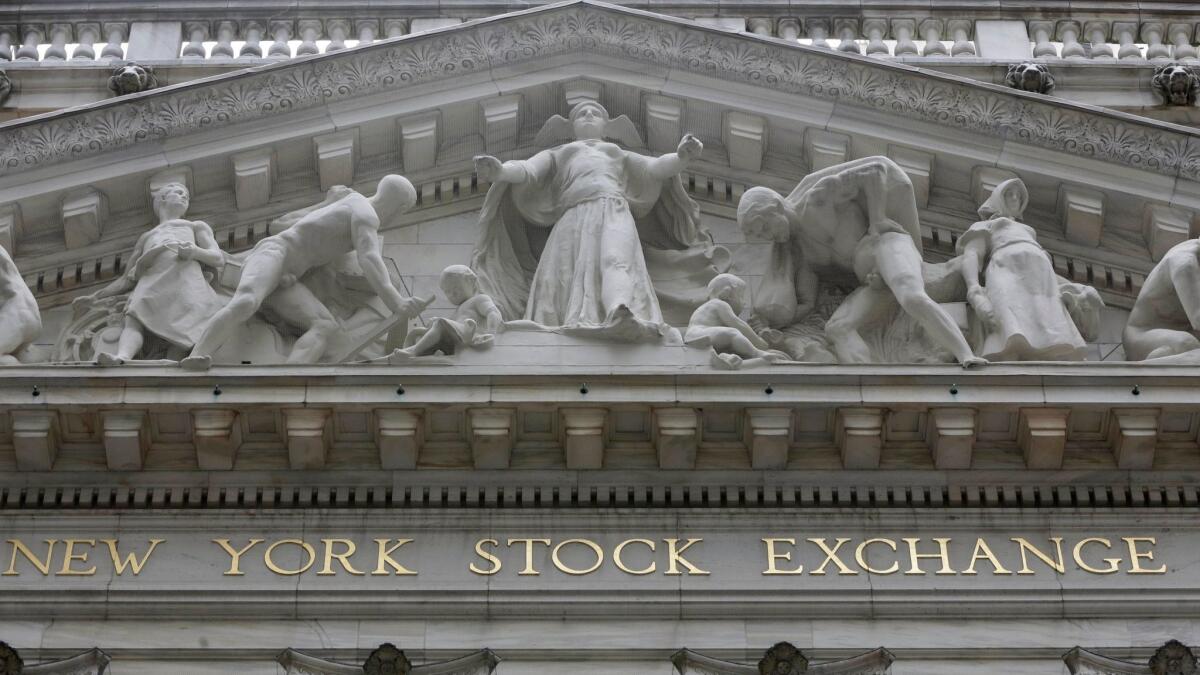Banks, technology companies lead stocks lower

- Share via
Escalating tensions on the Korean peninsula rattled nerves Tuesday on Wall Street, leading to the stock market’s worst day in almost three weeks.
Bank stocks led the slide as bond yields slumped. Technology stocks, the biggest gainers this year, also pulled the market lower. Energy companies climbed the most as the price of crude oil rose.
Traders also bid up shares in traditionally safer investments such as utilities and gold, which climbed to its highest level in more than a year.
The Standard & Poor’s 500 index slid 18.70 points, or 0.8%, to 2,457.85. The Dow Jones industrial average slumped 234.25 points, or 1.1%, to 21,753.31. The average had been down more than 277 points during the session. The Nasdaq composite lost 59.76 points, or 0.9%, to 6,375.57. The Russell 2000 index of smaller-company stocks gave up 13.92 points, or 1%, to 1,399.66.
Stocks were coming off back-to-back weekly gains as investors returned from the Labor Day holiday weekend to heightened tensions between the U.S. and North Korea, which conducted its most powerful nuclear test to date Sunday, triggering U.S. warnings of a “massive military response.”
On Tuesday, South Korean warships conducted live-fire exercises at sea. The U.N. Security Council held an emergency meeting and American Ambassador Nikki Haley said North Korean leader Kim Jong Un is “begging for war.”
The latest developments fueled anxiety in the markets. The VIX, a measure of how much volatility investors expect in stocks, jumped 20.7% to 12.23.
Gold rose $14.10, or 1.1%, to $1,344.50 an ounce. That’s the highest price since gold hit $1,348.40 an ounce Sept. 27.
Bond prices also rose. The yield on the 10-year Treasury note fell to 2.06% from 2.17% late Friday.
The slide in bond yields weighed on shares in banks and other financial companies. Lower bond yields push interest rates on loans lower, hurting banks’ profits. XL Group slid $2.35, or 5.8%, to $38.27, while Brighthouse Financial lost $3.41, or 5.9%, to $54.08. All told, the financial sector fell 2.2% on Tuesday, the biggest decliner in the S&P 500.
Technology companies also fell sharply. Qualcomm lost $2.02, or 3.9%, to $50.03. Nvidia gave up $4.55, or 2.7%, to $165.91.
Gains in crude prices helped lift shares in oil producers and other energy industry companies. Helmerich & Payne rose 75 cents, or 1.7%, to $43.77. Halliburton added 93 cents, or 2.4%, to $39.83.
Benchmark U.S. crude climbed $1.37, or 2.9%, to $48.66 a barrel on the New York Mercantile Exchange. Brent crude, used to price international oils, rose $1.04, or 2%, to $53.38 a barrel in London.
Shares in cruise line operators fell as Hurricane Irma roared toward islands in the northeast Caribbean on Tuesday. The Category 5 storm, the most powerful seen in the Atlantic in over a decade, was on a path that could eventually take it to the United States.
Royal Caribbean Cruises slid $5.20, or 4.2%, at $119.04, while Carnival declined $2.16, or 3.1%, to $66.97. Norwegian Cruise Line shed $1.85, or 3.2%, to $56.69.
The dollar declined to 108.66 yen from Monday’s 110.24 yen. The euro rose to $1.1918 from $1.1869.
In other energy trading, wholesale gasoline fell 5 cents to $1.70 a gallon. Heating oil was little changed at $1.75 a gallon. Natural gas slid 10 cents, or 3.2%, to $2.97 per 1,000 cubic feet.
Among metals, silver rose 13 cents to $17.94 an ounce, while copper gained 1 cent to $3.13 a pound.
Stock markets overseas were mixed Tuesday.
In Europe, Germany’s DAX rose 0.2%, while the CAC 40 in France declined 0.3%. London’s FTSE 100 lost 0.5% after a survey of business activity showed a slowdown.
In Asia, Tokyo’s Nikkei 225 fell 0.6% and Seoul’s Kospi slid 0.1%. Hong Kong’s Hang Seng added 1.1%.
UPDATES:
5:25 p.m.: This article was updated after the close of markets.
8 a.m.: This article was updated with market prices and context.
This article was originally published at 6:50 a.m.
More to Read
Inside the business of entertainment
The Wide Shot brings you news, analysis and insights on everything from streaming wars to production — and what it all means for the future.
You may occasionally receive promotional content from the Los Angeles Times.










